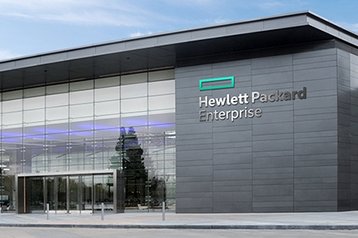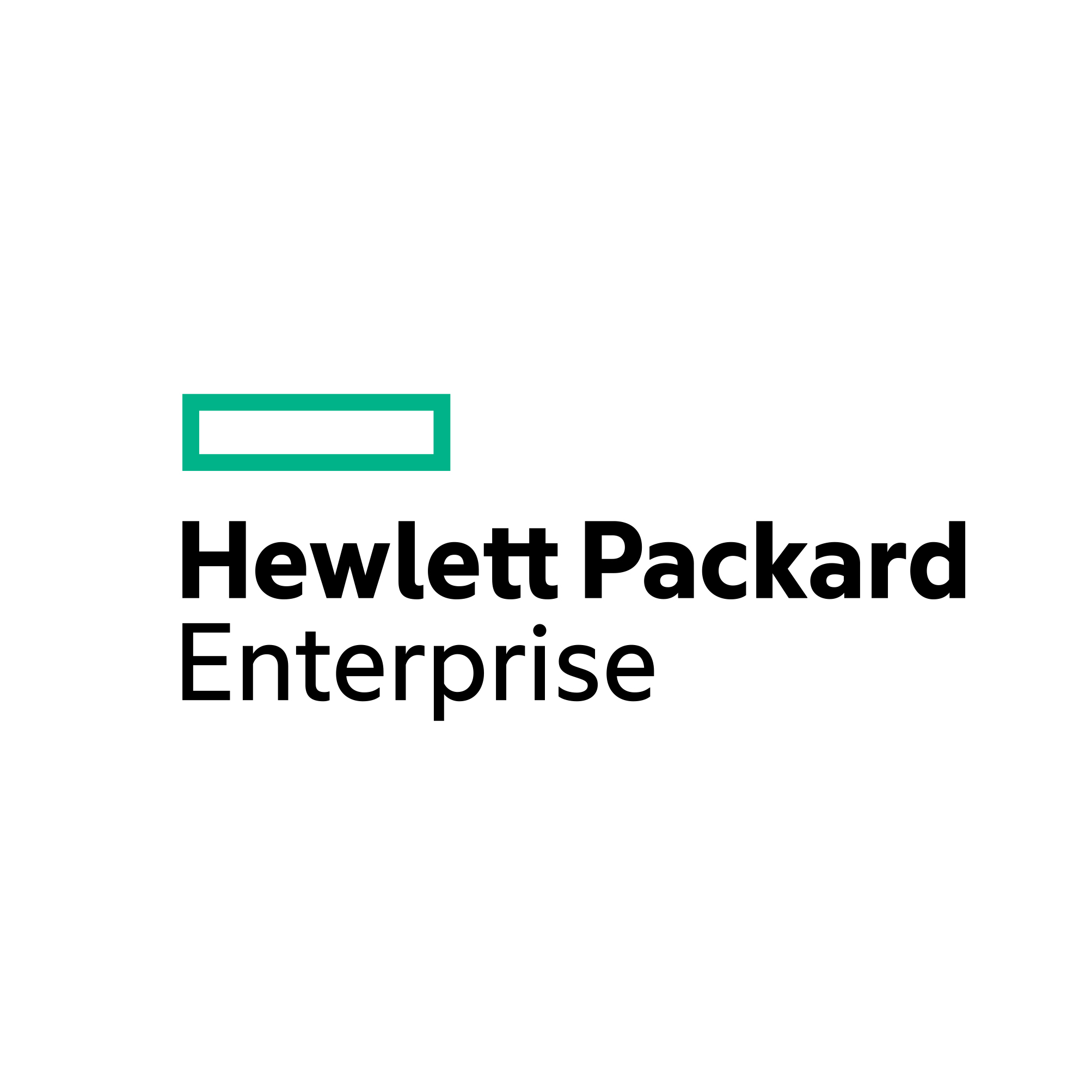Hewlett Packard Enterprise Reports Weak Guidance

Hewlett Packard Enterprise (NYSE:HPE) disclosed its first-quarter results and softer-than-expected guidance, highlighting challenges in its networking sector.
For Q1, HPE reported an adjusted EPS of $0.48 on revenues of $6.76 billion, compared to the anticipated $0.45 EPS and $7.10 billion revenue. The revenue shortfall is attributed to a weakening networking market and the timing of GPU deals.
For Q2, HPE anticipates adjusted earnings per share (EPS) between $0.36 and $0.41, with revenue estimates ranging from $6.6 billion to $7.0 billion. This projection falls below Wall Street's expectations of $0.45 EPS on $7.13 billion in revenue.
Looking into fiscal 2024, HPE projects an EPS between $1.82 and $1.92, with expected revenue growth ranging from flat to a 2% increase.
| Symbol | Price | %chg |
|---|---|---|
| SUPR.JK | 43875 | 0 |
| KETR.JK | 600 | 0 |
| 4333.HK | 400 | 0 |
| 178320.KQ | 24450 | 8.59 |

Hewlett Packard Enterprise (HPE) Sees Executive Stock Sale and Strategic Acquisitions
On June 30, 2025, Phil Mottram, Executive Vice President and General Manager of Intelligent Edge at Hewlett Packard Enterprise (NYSE:HPE), sold 30,000 shares of HPE's Common Stock at approximately $20.54 each. This transaction leaves him with 42,427 shares. HPE, a major player in the tech industry, focuses on enterprise products and services, competing with companies like Dell Technologies and Cisco Systems.
Hewlett Packard Enterprise recently experienced a significant boost in its stock price following the U.S. Department of Justice's approval of its $14 billion all-cash acquisition of Juniper Networks. Initially, the DOJ had concerns about reduced competition in the WLAN technology sector, but a settlement was reached. As part of the agreement, HPE will divest its Instant On campus and branch WLAN business and allow limited access to Juniper's Mist AI Ops technology to competitors.
The settlement with the DOJ has positively impacted HPE's stock, which surged by 13.3% to $20.69, its highest level since February. This increase positions the stock to potentially close above the 320-day moving average for the first time since March, breaking away from a prolonged consolidation around $18. The acquisition is expected to reshape the competitive landscape in the server and networking sectors.
HPE's financial metrics provide insight into its market valuation. The company has a price-to-earnings (P/E) ratio of approximately 18.96, indicating the price investors are willing to pay for each dollar of earnings. Its price-to-sales ratio stands at about 0.85, suggesting the market values the company at 85 cents for every dollar of sales. The enterprise value to sales ratio is around 1.05, reflecting the company's total valuation relative to its sales.
HPE's financial health is further highlighted by its enterprise value to operating cash flow ratio of approximately 14.22, showing how the company's valuation compares to its cash flow from operations. The company's debt-to-equity ratio is approximately 0.73, indicating a moderate level of debt relative to its equity. Additionally, HPE has a current ratio of about 1.29, demonstrating its ability to cover short-term liabilities with short-term assets.

Hewlett Packard Enterprise Co (NYSE:HPE) Strategic Moves and Market Impact
Hewlett Packard Enterprise Co (NYSE:HPE) is a global technology company that provides solutions in IT infrastructure, software, and services. It competes with major players like Cisco Systems in the networking and server markets. Recently, Bank of America Securities maintained a "Buy" rating for HPE, with the stock priced at around $20.59, suggesting confidence in its future performance.
The U.S. Department of Justice (DOJ) has approved HPE's $14 billion all-cash acquisition of Juniper Networks, a strategic move that strengthens HPE's position against competitors like Cisco. This settlement allows HPE to proceed with the acquisition, enhancing its capabilities in the server market. The DOJ initially opposed the merger due to competition concerns but reached a settlement with HPE and Juniper.
As part of the settlement, HPE agreed to divest its global Instant On campus and branch WLAN business. Additionally, it will provide limited access to Juniper's Mist AI Ops technology to competitors. This ensures the transaction's value remains intact while fostering competition in the global networking market, as highlighted by HPE CEO Antonio Neri.
Following the DOJ's approval, HPE's stock experienced a significant rise, increasing by 12.5% to approximately $21. The stock has fluctuated between $20.13 and $20.97 during the day, with a market capitalization of about $26.97 billion. The trading volume reached 39.57 million shares, reflecting investor interest in the company's strategic moves.
HPE's stock has seen a 11.65% increase, with a change of $2.15, indicating positive market sentiment. Over the past year, the stock has ranged from a low of $11.97 to a high of $24.66. This recent development positions HPE to better compete in the tech industry, particularly in the server and networking sectors.

Hewlett Packard Enterprise (HPE) Surpasses Earnings Expectations
Hewlett Packard Enterprise (NYSE:HPE) is a global technology company that provides solutions in IT infrastructure, software, and services. It focuses on helping businesses transform their operations through technology. HPE competes with other tech giants like Dell Technologies and IBM. The company is known for its strong presence in the enterprise market, offering products and services that cater to various business needs.
On June 3, 2025, HPE reported earnings per share (EPS) of $0.38, surpassing the estimated $0.34. This performance reflects the company's ability to exceed market expectations, as highlighted by its revenue of $7.63 billion, which also exceeded the estimated $7.50 billion. The revenue marked a 6% increase compared to the previous year, showcasing HPE's growth trajectory despite challenges in the global market.
Despite a decrease in adjusted net income to $545 million from $561 million in the same quarter last year, HPE's EPS still surpassed estimates. This achievement is significant, considering the company's impairment charge of $1.36 billion during the period. Following the earnings announcement, HPE shares rose by over 3% in after-hours trading, although they were down 17% for the year up to that point.
Looking ahead, HPE has adjusted its full-year profit forecast, raising the lower end of its adjusted EPS guidance to $1.78 from $1.70. This aligns with Wall Street's expectations and reflects the company's positive outlook, partly due to a recent tariff exemption. HPE's third-quarter revenue forecast of $8.2 billion to $8.5 billion also exceeded analysts' predictions, indicating continued growth potential.
HPE's financial metrics provide further insight into its market position. With a price-to-earnings (P/E) ratio of 8.33 and a price-to-sales ratio of 0.74, the market values HPE's earnings and sales favorably. The enterprise value to sales ratio of 0.89 and enterprise value to operating cash flow ratio of 7.12 highlight the company's valuation relative to its sales and cash flow generation. Additionally, HPE's debt-to-equity ratio of 0.71 and current ratio of 1.33 indicate a moderate level of debt and healthy liquidity, respectively.

Hewlett Packard Enterprise (NYSE:HPE) Quarterly Earnings Preview
- The anticipated EPS of $0.34 marks a 19.1% decline from the previous year, indicating challenges HPE faces.
- Revenue is projected to increase by 3.7% to $7.47 billion, showing potential growth despite obstacles.
- HPE's valuation remains attractive with a forward P/E ratio under 10 and a strong dividend yield, reflecting limited growth expectations and ongoing business challenges.
Hewlett Packard Enterprise (NYSE:HPE) is preparing to announce its quarterly earnings on June 3, 2025. Analysts predict an earnings per share (EPS) of $0.34, with revenue expected to be around $7.47 billion. HPE, a key player in the technology sector, provides solutions in IT infrastructure, software, and services. It competes with companies like Dell Technologies and IBM.
The anticipated EPS of $0.34 marks a 19.1% decline from the previous year, highlighting some challenges HPE faces. Despite this, revenue is projected to increase by 3.7% to $7.47 billion, as highlighted by the recent analyst consensus. This upward revision of EPS by 0.7% over the past month suggests a positive reassessment by analysts, which can influence investor sentiment and stock price movements.
HPE is currently dealing with several challenges, including delays in its acquisition of Juniper, which affects its free cash flow. Trade and tariff issues also pose hurdles. Despite these challenges, HPE's valuation remains attractive, with a forward P/E ratio under 10 and a strong dividend yield. However, this valuation reflects limited growth expectations and ongoing business challenges.
Activist investor Elliott Management's $1.5 billion stake in HPE could lead to significant changes within the company. However, concerns about leadership uncertainty and execution risks persist. HPE's financial metrics, such as a P/E ratio of 8.31 and a price-to-sales ratio of 0.74, indicate the market's valuation of its earnings and sales. The company's enterprise value to sales ratio of 0.89 and enterprise value to operating cash flow ratio of 7.11 provide insights into its valuation relative to sales and cash flow generation.
HPE's earnings yield of 12.03% offers a perspective on the return on investment, while its debt-to-equity ratio of 0.71 shows the proportion of debt used to finance its assets. The current ratio of 1.33 suggests that HPE has a good level of liquidity to cover its short-term liabilities, indicating financial stability despite the challenges it faces.

HPE Shares Plunge 15% as Weak Guidance and Margin Pressure Weigh on Results
Hewlett Packard Enterprise (NYSE:HPE) saw its shares tumble over 15% intra-day today after delivering a mixed fiscal first-quarter report and issuing weaker-than-expected guidance. The company also announced job cuts, adding to investor concerns.
For the quarter, HPE posted adjusted earnings per share (EPS) of $0.49, narrowly missing Wall Street estimates of $0.50. However, revenue came in at $7.85 billion, slightly surpassing the consensus estimate of $7.81 billion and marking a 16% year-over-year increase.
CEO Antonio Neri highlighted that the company achieved its fourth consecutive quarter of year-over-year revenue growth, with double-digit gains in Q1. Despite this, profitability took a hit, as non-GAAP gross margin fell 680 basis points year-over-year to 29.4%.
HPE’s outlook significantly dampened investor sentiment. The company expects second-quarter adjusted EPS in the range of $0.28-$0.34, far below the analyst consensus of $0.50. Revenue guidance of $7.2-$7.6 billion also missed expectations of $7.93 billion.
For the full fiscal year 2025, HPE forecasted adjusted EPS of $1.70-$1.90, trailing Wall Street’s projection of $2.13. Revenue is projected to grow by 7-11% in constant currency, while non-GAAP operating profit growth is expected to range between -10% and 0%.
Adding to the disappointment, HPE provided an operating margin forecast of around 9% at the midpoint, falling short of the 10.7% consensus estimate. With weaker earnings projections and ongoing margin compression, the market reacted sharply, leading to a steep sell-off in HPE shares.

HPE Shares Plunge 15% as Weak Guidance and Margin Pressure Weigh on Results
Hewlett Packard Enterprise (NYSE:HPE) saw its shares tumble over 15% intra-day today after delivering a mixed fiscal first-quarter report and issuing weaker-than-expected guidance. The company also announced job cuts, adding to investor concerns.
For the quarter, HPE posted adjusted earnings per share (EPS) of $0.49, narrowly missing Wall Street estimates of $0.50. However, revenue came in at $7.85 billion, slightly surpassing the consensus estimate of $7.81 billion and marking a 16% year-over-year increase.
CEO Antonio Neri highlighted that the company achieved its fourth consecutive quarter of year-over-year revenue growth, with double-digit gains in Q1. Despite this, profitability took a hit, as non-GAAP gross margin fell 680 basis points year-over-year to 29.4%.
HPE’s outlook significantly dampened investor sentiment. The company expects second-quarter adjusted EPS in the range of $0.28-$0.34, far below the analyst consensus of $0.50. Revenue guidance of $7.2-$7.6 billion also missed expectations of $7.93 billion.
For the full fiscal year 2025, HPE forecasted adjusted EPS of $1.70-$1.90, trailing Wall Street’s projection of $2.13. Revenue is projected to grow by 7-11% in constant currency, while non-GAAP operating profit growth is expected to range between -10% and 0%.
Adding to the disappointment, HPE provided an operating margin forecast of around 9% at the midpoint, falling short of the 10.7% consensus estimate. With weaker earnings projections and ongoing margin compression, the market reacted sharply, leading to a steep sell-off in HPE shares.

Hewlett Packard Enterprise Surpasses Q4 Expectations with Record Revenue, Shares Gain 9%
Hewlett Packard Enterprise (NYSE:HPE) saw its shares climb over 9% intra-day today after delivering fourth-quarter results that slightly exceeded expectations and offering guidance for the upcoming quarter that aligned with analyst projections.
For the quarter, HPE reported adjusted earnings per share of $0.58, surpassing the Street consensus estimate of $0.56. Revenue hit a record $8.5 billion, marking a 15% year-over-year increase and outpacing analysts' forecast of $8.26 billion.
The company's growth was propelled by strong performances in its server and hybrid cloud divisions. Server revenue surged 32% year-over-year to $4.7 billion, while hybrid cloud revenue grew 18% to reach $1.6 billion, showcasing the strength of its diversified enterprise solutions portfolio.
Looking ahead, HPE projected first-quarter 2025 adjusted earnings per share to range from $0.47 to $0.52, in line with the Street consensus estimate of $0.48. The company also expects mid-teens percentage revenue growth year-over-year in the upcoming quarter.







